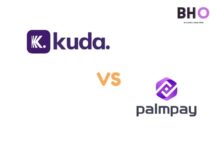Palmpay vs Opay: Which is Better?
Palmpay vs Opay: When it comes to e-payment services, two popular options in Nigeria are Palmpay and Opay. Both provide secure, convenient payment platforms that allow users to make online payments. Which one is better though? Let’s take a closer look at both Palmpay and Opay to find out.
Table of Contents
What Is Pampay?
It is a digital payment service that provides access to online payments, remittances, and investments for users across Africa. It was founded in 2017 and has grown rapidly since then. With Palmpay, users are able to send money to anyone they want with just their phone number.
They can also purchase prepaid airtime from over 10 different network providers such as Airtel, MTN, and Glo and pay their bills securely with their debit cards or bank accounts. In addition, they can use the app for investment options such as buying cryptocurrency or stocks.
What Is Opay?
If you’re interested in choosing between Palmpay and Opay, it’s important to understand what each of them offers. First up is Opay.
Opay is an online payment platform that operates under the OPay brand name in Nigeria. It allows users to send and receive money from their mobile devices and provides various services such as bill payments, airtime top-ups, shopping, wallet top-ups, and bank transfers.
The service also offers various merchant services such as business registration, booking systems for events and hotels, and online stores. Also, users can benefit from discounts and rewards when using Opay. It’s also integrated with major banks in Nigeria for easier payments.
Comparison: Fees and Charges
It’s undeniable that fees and charges play a large part when it comes to making a decision between Palmpay and Opay. But which one has lower fees and charges?
Palmpay
Palmpay offers several advantages to its users. The major benefit is the low transaction fees. With Palmpay, you can send up to NGN500 free of charge, while transfers of more than that will cost you a fee set by the Central Bank of Nigeria (CBN). For instance, transfers above NGN2,000 will attract a fee of NGN100 plus 1% of the total amount you are sending.
Opay
With Opay, it’s not as straightforward as Palmpay when it comes to fees and charges. While some transactions on the platform are free, others come with some associated costs. For example, bank withdrawals from Opay wallets incur a transaction fee ranging from NGN10-50 depending on the bank branch you are using for the withdrawal. Furthermore, you’ll be charged 1% flat rate for all cash transfers made via Opay using either your debit card or bank account. So keep these in mind when making your choice between Palmpay or Opay, which one fits your needs in terms of fees and charges?
Comparison: Transaction Limits
If you’re comparing the two services, transaction limits should be at the top of your list. With Palmpay, you can transact up to 500,000 Naira per day. Howeve, Opay allows transactions up to 1 million Naira per day.
Transaction Fees
In terms of fees, Opay charges a flat fee on all transactions from between 0.4% and 1%, while Palmpay charges a minimum fee of ₦50 for all transactions above ₦2,000.
Payment Option Flexibility
When it comes to payment option flexibility, Palmpay offers an impressive range of options, from debit and credit card payments to bank transfers and mobile wallet transfers across leading banks in Nigeria. On the other hand, Opay offers limited payment options, depending on the location of the buyer or seller.
Loyalty Points
If you’re looking for a comprehensive loyalty program that rewards your customer base for their loyalty and trustworthiness, then you might want to consider Opay instead of Palmpay as it offers loyalty points when transactions are made with certain banks or cards in the system.
READ ALSO- Kuda vs Opay: Which is Better?
Palmpay vs Opay: which is better?
So you’re trying to decide between Palmpay and Opay, which is the better service?
There’s no one-size-fits-all answer here because both Palmpay and Opay have their own unique benefits that might be best for different people.
Palmpay Benefits
Palmpay comes with a few big advantages, such as:
- Low transfer fees: transfers are generally free for Palmpay users, or very low; plus, you can get discounts for transfers over a certain amount.
- Easy banking options: it’s easy to link your bank account to Palmpay, so that money transfers are a breeze.
- Safe & Secure: Transfers are secured with multi-factor authentication; plus, your data is encrypted when you transfer funds.
Opay Benefits
On the other hand, Opay might be better for some people because of its features such as:
- Quick transactions: transactions usually take 10 minutes or less when using Opay.
- Convenient payment methods: You can pay via bankcard, credit card or with your linked bank account. Plus, you can even use QR codes for payments via your phone camera.
- Cheap international transfers: You get cheap international money transfers when using Opay; plus, some international transfers are free if they meet certain criteria.
FAQs
If you’re still wondering which payment app to go for, here are some answers to frequently asked questions about Opay and Palmpay.
What is the cost of using Opay and Palmpay?
Using both Opay and Palmpay is free. Both apps have a zero fee structure, so you don’t have to worry about paying extra when you transfer money to someone or make a purchase.
What are the benefits of using Opay and Palmpay?
The biggest benefit with both Opay and Palmpay is convenience; you can make payments without cash, and you can do it quickly from your phone. Both apps also offer great customer service support, so if there’s an issue, you can easily contact the customer service team for help. Additionally, both apps provide discounts or incentives when you use them; so if you’re looking for discounts or rewards points when making a purchase or transfer money, then these payment apps are definitely worth considering.
Are there any security risks associated with using Opay or Palmpay?
Both payments apps take online security very seriously; they use industry-standard encryption technology to keep all your data safe and secure. They also have measures in place to keep your account secure like two-factor authentication, which requires an extra verification code when logging in from a new device. So yes, both apps are quite secure!




